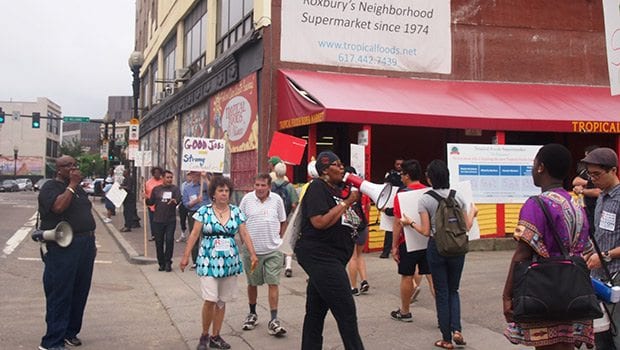
Protesters are holding a daily picket outside of the Tropical Foods supermarket on Washington Street, where Madison Park Community Development Corporation is rebuilding and expanding the supermarket, alleging workers are being paid substandard wages.
The $15 million project for Parcel 10 is in the first phase of a multistep development that will make a new home for the existing Tropical Foods along with ground-floor retail space, office space, 30 residential units and parking spaces in the Melnea Cass Boulevard, Washington Street and Shawmut Avenue area. The parking lot of the site is under union construction, but the structure to house the market is not.
The protesters claim that local laborers working on the store structure are being paid unfair wages and that the project is not in compliance with the Boston Residency Job Policy.
“Tropical Foods and Madison Park said they would pay workers $50 an hour for non-union rate,” Black Economic Justice Institute program director Pricilla Flint said.
“They aren’t paying the wages they promised when they filled out the request for proposal, which is not acceptable.”
Madison Park Chief Executive Officer Jeanne Pinado said the $50 an hour was used as a total labor cost figure.
“That number was probably too high and we probably shouldn’t have used it,” Pinado said. “I think community members were surprised to find that the site is an open shop job, so each contractor pays people their own wages. There was no schedule of wages.”
Pinado said that the more realistic wage is closer to $35 an hour, but there is a wide pay range. Pinado said that a misunderstanding in the early goings lead to the beginning of the conflict, when a worker walked onto the job site and was paid $11 an hour.
“Once we heard about this, we told the subcontractor to go back and retroactively pay that person on a $15 an hour scale,” Pinado said. Pinado said that this was a one-time occurrence, but Boston Workers Alliance Campaign Coordinator Hakim Cunningham said that there have been at least five similar instances.
“A lot of non-union workers have been told not to talk to protesters,” Cunningham said. “There are a lot of different layers of decision making that are putting our community at a disadvantage because we aren’t getting what we were promised.”
Another qualm protesters have is the question of whether or not the development project is in compliance with the Boston Resident Job Policy, which requires developers to hire construction crews made up of 50 percent Boston residents, 25 percent minorities, and 10 percent females.
“A lot of subcontractors have their own crews, so if you’re from Lawrence, Lowell, Fall River or somewhere outside of Boston, you bring your people in with you,” Cunningham said. “By not hiring people from the communities, they’re taking food off the plates of families from Roxbury, Dorchester and Mattapan.”
Pinado said that the project is in compliance with the Resident Job Policy to the best of their capabilities.
“We’re operating, as of July 8, at 55 percent minority, 36 percent Boston residents and 5.3 percent females,” Pinado said. “These aren’t up to the standards yet, but given the constrained labor numbers, those are good standings. Things are heading in the right direction there.”
Flint said that the community hiring is lacking, especially in the female numbers.
“People are being brought in from out of town to work this job,” Flint said. “Our community is tired of this. We see the construction, the roadwork, the cranes and the buildings going up. People are being gentrified out of the community and when they are struggling to get jobs that are going on in their neighborhoods, how can they afford to stay in the community with the sky high rents?”
Pinado said that in the last three years, Madison Park has overseen a large number of construction contracts, and the purchasing has mostly gone to minority owned businesses.
“We have a lot in common with these groups who’re out there protesting,” Pinado said. “We all want to work good jobs for livable wages. I think a few instances have been used against us for another agenda.”
Flint said that a sit-down between Madison Park and the protesting groups and Boston City Councilor Tito Jackson has been set for Wednesday morning at the B2 district police station.
“We’re trying to get the community to get more involved in what’s going on in their backyards,” Flint said. “I don’t know if people are in denial or what, but pretty soon people won’t be able to afford to live where they grew up. Things are changing down in Dudley Square and it doesn’t seem to be to the black families benefits.”






